Celebrating Canada’s Sesquicentennial: Trinity’s Graduates of the Class of 1867
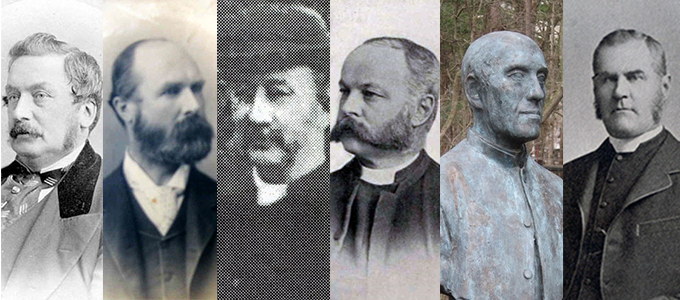
Trinity College Graduates of the Class of 1867
Trinity College is celebrating Canada’s Sesquicentennial by reflecting on its storied past through profiles of the graduates of the Class of 1867 and their impact and legacy they left on the city, country and abroad.
Trinity’s Class of 1867 consisted of 10 graduates who matriculated in 1863 and 1864. Of the 10, six became Anglican priests; of these three moved through small parishes in Ontario, one relocated to the U.S., one became a celebrated missionary to Japan and one, who was also a physician, might be described as a scoundrel (see Angus Ross Kennedy). There were three businessmen, one a very successful entrepreneur and author (Cumberland), one a career executive (Foster), and one with a series of successes and failures that took him to the mines of the B.C. interior (Moffatt). There was one lawyer in the group, also with business interests, who spent most of his life in Peterborough but suffered some sort of misadventure and ended up bankrupt in London (England). Only Charles Colley Foster stayed in Toronto his whole life; a surprising element of many of their lives is the extent of their travel.
About half the class also received an MA from Trinity College, and why not? The 1864 Statutes dictate that admission to this degree required a BA of three years’ standing, and various oaths and fees but no course of study.
There were no women of course. The admission of women and the founding of St. Hilda’s was several years in the future. All members of the class were from English, Irish or Scottish stock. Most were the first in their family to receive a university education. Several were members of the Masonic Lodge. Almost all fought in the Fenian Raids. The Rev. Lee was the only bachelor and most had children. There are frustrating gaps in the available facts, but due to the wonders of Ancestry and Google we’ve been able to trace their movements, if not the fine-grained details of their lives.
1867 saw the birth of Canada and the death of Bishop John Strachan. Bishop Strachan, whose influence on the new country was substantial, was about to become part of the past. After his death, Trinity College would undergo changes unforeseen by the Founder. Trinity College was in the business of educating gentlemen, and aspiring gentlemen, who would add to the cultural, economic and spiritual life of Canada. In Bishop Strachan’s words: “Our first and great object will be ever to produce young men of moral worth and sound learning – men who will in after life do honour to their professions, and bless the Society in which they move.” By that measure, Dr. Kennedy aside, the Class of 1867 made a pretty good show.
By Sylvia Lassam, Rolph-Bell Archivist, Trinity College
The profiles of the Class of 1867 graduates were prepared by the students of the Trinity College Historical Society
Frederick Barlow Cumberland
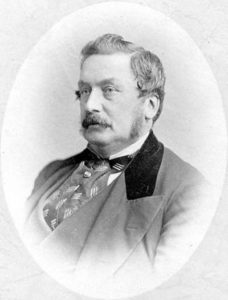 Frederick Barlow Cumberland was born in England in 1846 to Frederick William Cumberland and Mary Wilmot, Frederick Barlow Cumberland’s family emigrated to Toronto soon after his birth, where his mother’s family already resided. His father was a renowned architect, engineer and political figure whose work included notable buildings in Toronto and Ontario such as the Cathedral Church of St. James (1853) and University College at the University of Toronto (1856-59). Additionally, he was part of the Corporation of Trinity College from 1869 to 1870.
Frederick Barlow Cumberland was born in England in 1846 to Frederick William Cumberland and Mary Wilmot, Frederick Barlow Cumberland’s family emigrated to Toronto soon after his birth, where his mother’s family already resided. His father was a renowned architect, engineer and political figure whose work included notable buildings in Toronto and Ontario such as the Cathedral Church of St. James (1853) and University College at the University of Toronto (1856-59). Additionally, he was part of the Corporation of Trinity College from 1869 to 1870.
Cumberland was sent to Cheltenham College in England before attending Trinity College in Toronto in the 1860s where alongside a fellow student, he codified the rules of rugby based on the “Rugby style of game.” He obtained a Master’s degree from Trinity in 1871. The same year, he married Sarah Catherine Seraphina Fraser. They moved to Port Hope, Ontario.
Throughout his lifetime, Cumberland remained a strong promoter of the Niagara Navigation Company. He served as vice-president of the company from 1878 to 1912. He is the author of many books including The Northern Lakes of Canada (1886) as well as A Century of Sail and Steam on the Niagara River (1913). Frederick Barlow Cumberland died of a kidney disease in 1913 at the age of 67.
By Klara Strasser, Trinity College Historical Society
Charles Colley Foster
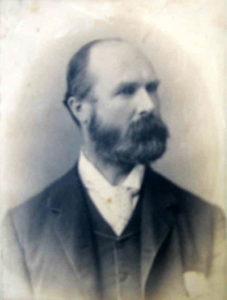 Charles Colley Foster was born on December 2, 1839 in Toronto. His parents were Montreal native Colonel Colley Lyons Lucas Foster and English immigrant Elizabeth Charrington Humphreys, who was the elder Foster’s second wife. Foster’s father passed away when he was age 4, and his half-brother followed four years later. He was enrolled in Upper Canada College in 1848 at the age of 9, and then entered Trinity College in 1863 before graduating as a Bachelor of Arts in 1867.
Charles Colley Foster was born on December 2, 1839 in Toronto. His parents were Montreal native Colonel Colley Lyons Lucas Foster and English immigrant Elizabeth Charrington Humphreys, who was the elder Foster’s second wife. Foster’s father passed away when he was age 4, and his half-brother followed four years later. He was enrolled in Upper Canada College in 1848 at the age of 9, and then entered Trinity College in 1863 before graduating as a Bachelor of Arts in 1867.
During his time at Trinity, he joined the College’s volunteer militia as a Private in 1866 amidst the Fenian Invasion, was active during the height of the raids in March to June, and he may have taken part in the Battle of Fort Erie that year. Foster would subsequently marry Elizabeth Jane Morris (b. June 18, 1845) on September 20, 1871, and they had five children – four sons and a daughter.
He was granted a Master of Arts degree in 1886. Around this time he took up work at the Western Assurance Co., becoming its Secretary Treasurer around the late 1880s or early 1890s; he retained that position until around the end of the First World War. He mostly stayed in the Toronto area throughout his life, though he moved several times.
He is known to have been a member of the Lambton Golf and Country Club. His wife Elizabeth died on September 11, 1897, age 52, two years after his mother’s passing. Most of the members of his family would leave Toronto and settle on the West Coast. Charles Colley Foster died at age 85 on July 13, 1925, with his eldest son Godwin Foster presiding over his burial in York.
By Milton Chow, Trinity College Historical Society
Thomas Garrett
Thomas Garrett was born about 1837 in Ireland and there is a Thomas Garrett listed as a school teacher in the 1860-61 Hastings County Directory. He entered Trinity College in 1864, and was a member of the Trinity College Rifle Company that served during the Fenian Raids. He married Leona Blasdell in 1872. Deaconed in 1868, he was priested in 1879.
In 1871 he is listed as an Anglican clergyman in Bear Brook. In 1887, he became the rector of St. Luke’s Anglican Church in Ottawa where he remained until his retirement around 1905. As the parish priest for St. Luke’s Church, his duties included overseeing the church and administrative duties. He was a member of the Ottawa Lodge of the Freemasons. He died in the Protestant Hospital for the Insane in Montreal in 1923.
By Annika Chambers, Trinity College Historical Society
Angus Ross Kennedy
Angus Ross Kennedy was born on March 31, 1842 in Kinnoul, Scotland. After receiving a BA from Trinity College in 1867 he attended Harvard Divinity School, graduating in 1868. This was accompanied by a religious conversion from the Anglican Church to Unitarianism, and he spent the next four years as a clergyman for the First Parish in Tyngsborough, Massachusetts.
In 1870, he married Mary Elizabeth Brinley. In 1872, he returned to Toronto as minister for Canada’s second Unitarian Church. He returned to Canada following increasing disenchantment with the Unitarian Church, and switched a second time, joining the Presbyterian Church and finishing his medical degree in Toronto. By 1878 he had returned to Scotland as a Presbyterian minister, but was suspended in 1884 following a committee investigation that concluded that his “living separately from his wife has not been satisfactorily accounted for.” In 1900 he married Rosalie Mary Tall but was divorced from her four years later when it came to light that his first wife was still alive. He abandoned the clergy, and the remainder of his life was spent practicing medicine in Coventry and Southampton, where he died in 1927, leaving his estate to spinster Evelyn May Baker.
By Jonah Shallit, Trinity College Historical Society
Charles Russell Lee
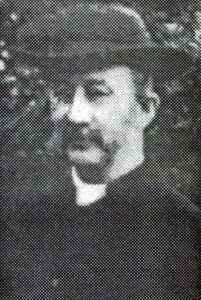 Charles Russell Lee was born in 1846, probably in London, Ontario, and was the son of Uzziel Clark Lee. He attended Trinity College from 1863 to 1867, graduating with a BA and obtaining an MA in 1886.
Charles Russell Lee was born in 1846, probably in London, Ontario, and was the son of Uzziel Clark Lee. He attended Trinity College from 1863 to 1867, graduating with a BA and obtaining an MA in 1886.
His grandfather was Riverius Hooker Lee, an American who fought in the War of 1812 on the British side and settled in Stratford. His father, Uzziel (or Uzial) Clark Lee, was the first merchant and first post master in Carronbrook, Ontario (near Stratford), now Dublin.
During his student days Charles was a volunteer with the militia. From 1873 to 1874, he taught at Trinity College School in Port Hope. He was deaconed in 1874, and priested in 1875, first serving at St. Alban the Martyr, Acton. He subsequently moved to Christ Church, Wainfleet, St. James, Port Colborne, St. Paul’s, Mount Forest, St. Paul’s, Port Robinson, and St. Paul’s, Glanford.
In 1892 he moved to St. Andrew’s Church Grimsby, retiring in 1905. A parish history describes him as “a man of considerable ability and possessed of a kind and generous disposition. His frequent benefactions to those in need were private and never done in a spirit of ostentation.” He died a bachelor in Grimsby in 1910.
By Sylvia Lassam, Rolph-Bell Archivist, Trinity College
Lewis Henry Moffatt
Lewis Henry Moffatt was born June 26, 1846 in Toronto. Moffatt matriculated at Trinity College in 1864, and was a member of the Trinity College Rifle Co.
His father of the same name was a businessman and politician who served as a member of the Council of Trinity College for the last 41 years of his life. His was also Lewis Henry’s business partner: first at the firm of Gillespie, Moffatt & Co. (a general wholesale supplier of dry goods, hardware, and groceries) and secondly at a firm of their own name, Lewis Moffatt & Son (later named Moffatt Bros & Co. when Kenneth Mackenzie Moffatt joined the team). The family’s firm met with failure in 1875, after many of Ontario’s large wholesale firms were hampered with heavy debts. Despite the Moffatt firm’s demise, Lewis Henry continued as a Toronto-based agent for the firm’s parent company: England’s Phoenix Fire Insurance Company.
He married Alice Tarbutt and had several daughters. It is likely that Lewis Henry’s religious views were influenced by his father, auditor and treasurer of the Church Society of the Diocese of Toronto, and churchwarden at St James’ Cathedral, since in the 1886 The Living Church Annual and Clergy-list Quarterly Lewis Henry Moffatt is listed as a trustee for the general institution of Toronto’s Trinity College University.
Later in life, Lewis Henry moved his family westward to Rossland in the West Kootenay region of British Columbia. Managing Director of the Rathmullen Mines there, as of 1899, Lewis Henry held 289,500 of the Rathmullen Consolidated Mining and Development Company’s 2,500,000 shares. However, due to the acquisition of new management, the company failed to prosper. Though Lewis Henry pleaded for the company to continue as its taxes had been consistently paid for years, in 1914 the company was legally abolished. Lewis Henry retired not long after that. He died in June 1929 in Nelson, British Colombia.
By Emma Dennis, Trinity College Historical Society
Ephraim Horace Mussen
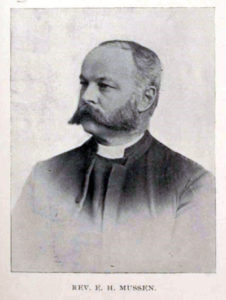 Ephraim Horace Mussen was born April 24, 1842 in Allanburgh, Welland County. He entered Trinity College in 1862 and graduated in 1867.
Ephraim Horace Mussen was born April 24, 1842 in Allanburgh, Welland County. He entered Trinity College in 1862 and graduated in 1867.
He was a member of the Queen’s Own Rifles for five years and fought in the Battle of Ridgeway in 1866. He became a deacon in 1869 and a priest in 1870, serving the parishes of Manvers, Caledonia, York, Cayuga, Niagara Falls, Lakefield, Scarborough and finally Aurora in 1882, where he remained until he died in 1918 at age 75.
He was married to May Victoria Schofield in 1873 and had three children. The Rev. Mussen was a Mason.
By Talia Lerner, Trinity College Historical Society
Alfred Passmore Poussette
Alfred Passmore Poussette was born in 1847 in Sarnia, Ontario, the son of Peter and Martha Poussette. He received a Bachelor of Arts from Trinity College. During his time at Trinity, he was a recipient of a third-year prize for Mathematics in 1867. Prizes were awarded according to the results of the June Annual Examination to students in Arts of second and third years. He was a member of the Queen’s Own Rifles.
Following his studies, Poussette was called to the bar on Easter in 1872, and set up practice in Peterborough (he was lawyer to the Strickland family) and had a number of business interests in railways, electricity and real estate. He married Emily Jane Barron of Lindsay, daughter of F.W. Barron, in 1874.
According to the Trinity College alumni directories, he moved to Toronto around 1910; in 1917-18 he is listed with a London, England address where it appears he stayed until the end of his life. In 1920, he and his wife were living in the Camden area of London and he is listed as bankrupt in the London Gazette. His wife died in Sarnia in 1925, likely in the care of his brother, Dr. Arthur C. Poussette. Alfred Poussette died in London in 1929. He was predeceased by his son, Waldo, in 1917. His son Arthur Courthope Barron Poussette fought in WWI and is last known to have lived in Algoma.
By Maya Murmann, Trinity College Historical Society
Alexander Croft Shaw
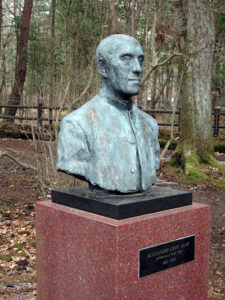 Alexander Croft Shaw was born on June 26, 1846 in Toronto and was a member of a long line of notable Scottish military men. Shaw was educated at the University of Trinity College where he earned a first class BA in Theology in 1867 and an MA in 1869.
Alexander Croft Shaw was born on June 26, 1846 in Toronto and was a member of a long line of notable Scottish military men. Shaw was educated at the University of Trinity College where he earned a first class BA in Theology in 1867 and an MA in 1869.
In the year 1873, The Venerable Shaw joined many protestant missionaries going from Canada to Japan. Shaw had travelled to England, where he became involved with the Society for the Propagation of the Gospel in Foreign Parts (SPG). The SPG was established under charter in 1701 as the missionary organization of the Church of England. When he travelled to Japan, he did so under the auspices of the SPG. Interestingly, another Trinity alumnus, William Gemmill, would follow later, and worked for the SPG until the year 1925.
When Shaw arrived in Japan, he initially took up residence in the house of Fukuzawa Yukichi; the founder of Keio University, which is the oldest institute of higher learning in Japan. His role here was two fold: he taught Yukichi’s three oldest children, and led some classes at Keio University. Concurrently, he took up residence at the Daishoji Temple in central Tokyo, where he led Sunday School classes, and perfected his Japanese.
From his arrival in 1873, to the year 1877, Shaw drew around 150 people to Christianity, including Yamagata Yokoni, who would go on to become the first ordained Japanese Deacon in the Anglican Church of Japan. In 1879, Shaw established St. Andrew’s Church, which became the centre of Anglican worship and clergy training in Tokyo. This has a legacy to the modern day, as a St. Andrew’s Cathedral still stands on the original site, and is still home to worship. The modern day cathedral, however, is not original, as the first, and second buildings were destroyed by an earthquake in 1890 and bombing in the Second World War, respectively.
Interestingly, Shaw is a sort of hero of a tourist district in Japan. Shaw spent the summer in Karuizawa in 1887, and he decided to build his summer Villa there in 1890. Soon, it was a popular summer destination for westerners working in Japan, and eventually a train line was extended to the town. It continues to exist as a tourist destination, and a reconstruction of his Villa, as well as the Shaw Memorial Chapel, still stand today.
Shaw was recognized as a critic of unequal treaties and extraterritoriality, and called for the cancellation of all extraterritoriality clauses in Anglo-Japanese treaties. He was a guest of the Meiji Emperor on November 29, 1890, at the first State Opening of Parliament in Tokyo. After the passing of the revised Anglo-Japanese Treaty of Commerce and Navigation in 1894, Shaw was formally thanked by the Japanese Government for his representation of Japanese opinions and culture to the outside world.
Shaw died in 1902 in Tokyo, after a long bout with influenza that ended in a fatal heart attack. He was buried in Japan, and upon his death, a token condolence gift of 1000 Yen was given to his widow by the Meiji Emperor, in recognition of his service to the nation of Japan.
By Isaac Wright, Trinity College Historical Society
Henry Harcourt Waters
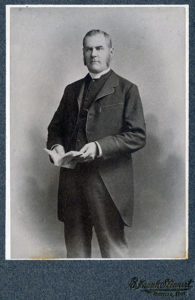 Henry Harcourt Waters was born on August 24, 1844 in Port Dover, Norfolk County, Ontario. He was the son of an Englishman, Thomas Waters, and a Canadian woman, Georgiana Stevens. Waters obtained his BA from Trinity College in 1867, however, he also spent two years studying law.
Henry Harcourt Waters was born on August 24, 1844 in Port Dover, Norfolk County, Ontario. He was the son of an Englishman, Thomas Waters, and a Canadian woman, Georgiana Stevens. Waters obtained his BA from Trinity College in 1867, however, he also spent two years studying law.
He was ordained deacon in England in 1867 and, the following year, he was ordained priest by the Right Reverend Dr. Ellicott, Bishop of Gloucester and Bristol. His first curacy was in Newland, Gloucestershire and one year later he became curate of Christ Church, Clifton, and Gloucestershire and he remained in this position for two years.
At the end of his time in England, he returned to Canada and became the curate of St. James Cathedral in Toronto for three years. Subsequently, Waters was appointed to the rectorship of St. Paul’s Episcopal Church of New Orleans. In 1879, he married May Carroll of New Orleans and they had four children. Waters worked in New Orleans for the remainder of his life and died in Orillia, Simcoe County, Ontario on February 7, 1902.
By Ursula Carmichael, Trinity College Historical Society
Categories: Discover Trinity; Theology


